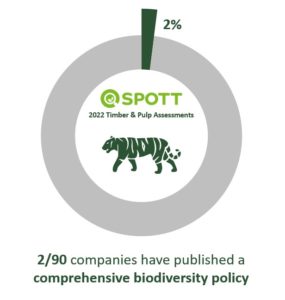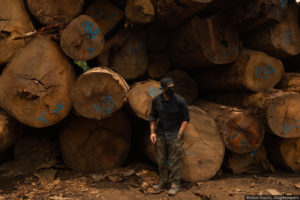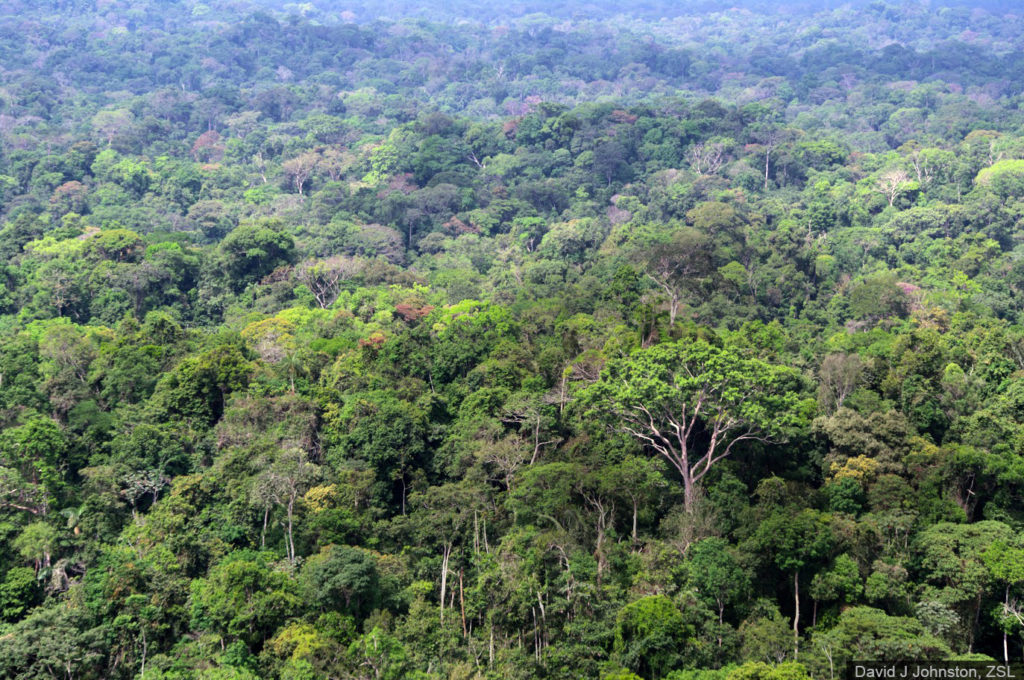A new assessment led by ZSL has revealed that only 2% (2/90) of the world’s leading tropical timber and pulp producers have a comprehensive biodiversity policy.
As record high temperatures are surpassed across the world, ZSL is urgently calling for the tropical forestry sector to set robust, measurable targets to reduce its impact on climate change – which is putting huge pressure on the ecosystems and wildlife where the sector operates.
Ranked according to specific sustainability metrics, the 100 companies assessed on ZSL’s SPOTT platform manage at least 44 million hectares of tropical forests – the planet’s most terrestrially biodiverse ecosystems. These companies and their buyers have a huge influence on the future health of these landscapes. To achieve a top score, they must demonstrate strong corporate sustainability commitments and report on how they are implementing these.

The 2022 assessment – the fifth annual scorecard published on SPOTT – includes a biodiversity indicator, with businesses needing to demonstrate a clear and measurable policy for reducing their impact on wildlife, habitats and natural resources. Only two companies scored full points here, by having comprehensive biodiversity policies in place. These were Interholco AG and APRIL Group who showed evidence of policies which include measurable targets for tree coverage, habitat restoration and protection of local wildlife populations. (See their biodiversity policies here: Interholco AG | APRIL Group)
However, the SPOTT team cautions that the implementation of these policies on the ground requires monitoring and verification to ensure they are effective. Robust policies like these provide a critical first step for companies towards meeting global sustainability targets – due to be set at CBD (Convention on Biological Diversity) COP15 in Montreal this December.
ZSL Sustainable Business & Finance Programme Manager, Oliver Cupit said: “Biodiversity is being lost at a rate not seen since the last mass extinction. The science is clear – we have a very small window of opportunity to change this, but if big companies such as the timber and pulp producers we’ve evaluated make pro-nature changes, we will see a significant impact.
“With a landmark year coming up for nature with the CBD COP15 and UNFCC COP27 on the horizon, we are calling on the corporate sector to take biodiversity loss seriously. Our SPOTT assessments show that the timber and pulp industry could make a huge difference by creating measurable targets that align with the global targets set at the upcoming conference in Montreal this December.”
The annually produced SPOTT scorecard found that while just over half – 53% (48/90) – of companies have a commitment to zero deforestation, only 13% (12/94) of companies also committed to ensuring that all their suppliers adhere to the same zero deforestation standards as them.
Just 9% (8/90) of companies provided comprehensive evidence of monitoring deforestation or impacts on ecosystems, and only 11% (10/94) of companies reported progress towards commitment to reduce GHG emissions intensity. Alongside over exploitation and habitat loss, climate change is one of the main drivers of biodiversity loss, while destruction of ecosystems undermines nature’s ability to regulate greenhouse gas (GHG) emissions, thus accelerating climate change.
“We have a choice.” said the United Nations secretary general António Guterres last week in a video message on climate change. “Collective action or collective suicide. It is in our hands.”
A roadmap for how global leaders and decision makers will support the halting of biodiversity loss by 2050 is set to be created at the international UN Biodiversity Conference, COP15. Parties to the CBD will gather there to conclude ongoing negotiations and decide on a new Post-2020 Global Biodiversity Framework. The first draft of this already has 20 action-oriented targets for 2030 and recognises the importance of the private sector in achieving these.
Cupit continued: “Most businesses assessed did demonstrate some improvements in transparency and sustainability year-on-year, but the overall improvement for the sector was disappointing and companies must be moving much more quickly on their sustainability commitments.”
The companies assessed on SPOTT – who voluntarily publish their policies and sustainability credentials – generally work at the upstream end of the supply chain with most being forest management companies, but they also include major sawmilling companies and large traders of raw materials.
Cupit added: “The EU regulation on deforestation-free products will soon be in place, requiring EU companies to ensure the products they buy have not led to deforestation in the country of harvest. Only half of the companies we assessed have a public commitment to zero-deforestation and just 9% show evidence of monitoring deforestation. If the forestry sector does not implement comprehensive monitoring, tropical timber could soon be seen as a no-go by EU importers due to this regulation. However, EU buyers can use SPOTT as part of their due diligence to identify which actors are proactively addressing deforestation and biodiversity loss.”
Buyers, financial institutions, NGOs and all supply chain stakeholders are encouraged to utilise SPOTT’s free and comprehensive data which is accessed via the dashboard.
International conservation charity ZSL is calling for world leaders to put nature at the heart of all global decision making and to tackle the loss of biodiversity hand-in-hand with efforts to address the climate emergency. You can support ZSL global science and conservation work by visiting www.zsl.org to learn more about and donate to our work.


